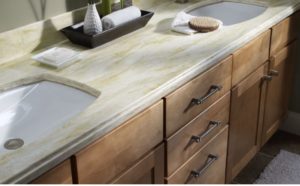 Cultured marble is a relatively new material used for countertops and other home renovation purposes—it’s less than 40 years old. A blend of marble and resin, cultured marble is cheaper, easier to care for, more versatile and easier to install than natural marble, making it a very popular choice for people looking for a marble look but without the headaches of dealing with the actual natural material itself.
Cultured marble is a relatively new material used for countertops and other home renovation purposes—it’s less than 40 years old. A blend of marble and resin, cultured marble is cheaper, easier to care for, more versatile and easier to install than natural marble, making it a very popular choice for people looking for a marble look but without the headaches of dealing with the actual natural material itself.
To make cultured marble, you start with actual marble dust. For a natural marble countertop, you need to find a piece of marble large enough to cut into the proper shape, but for cultured marble, you can take smaller fragments and powdered marble as the basis for the material. To that marble dust, manufacturers add a liquid polyester resin—about 75 percent marble to 25 percent resin. They mix everything together until it’s liquid smooth and consistent. They add color, but don’t mix it in entirely—that’s to create a vein-like effect like you would find in natural marble.
The liquid mix is then poured into molds matching your requirements—whatever shape and size you need your countertops to be. The liquid marble mix is then left to harden and solidify, and then a protective gel coating is applied to help prevent staining or discoloration.
Because each piece of cultured marble is specially tailored to the builder’ or customer’s requirements, you can be assured that it will fit perfectly into space for which it was designed; there’s no concern about cutting it to precisely match a preexisting space like you would have with natural marble. The mold often will contain decorative elements; sink basins, for example, can be molded right in with the original construction of the material. The end result is a unique countertop specifically designed to meet your exact needs.
The process makes the material more dense and durable than natural marble alone. The protective gel makes it less prone to discoloration and allows it to be cleaned with regular cleaners and household products, rather than requiring special, marble-specific cleaners. It combines the beauty and elegance of the natural stone—remember, it is actual stone, just blended with resin—with the functionality and simplicity of an artificial solid surface. In many ways, cultured marble is the best of both worlds, thanks to the care taken during its manufacturing process.




 Copyright © 2026 · Solid Surface · Web design by
Copyright © 2026 · Solid Surface · Web design by